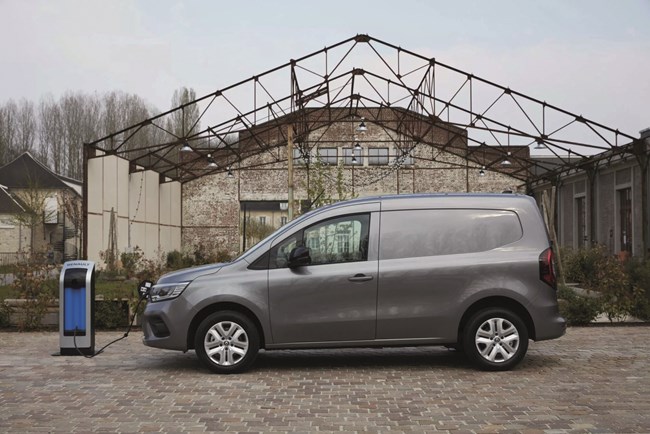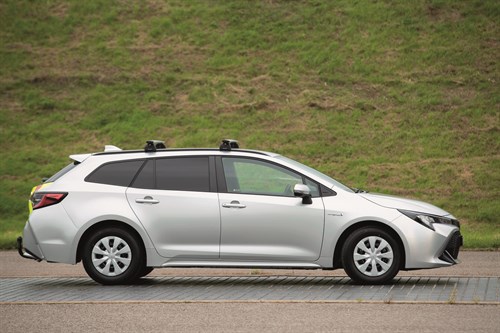- ETRUX launches new Ford E-Transit Trizone
- Renault gives UK debut to Master E-Tech at CV Show
- Isuzu D-Max long-term test – Latest Report
- Isuzu D-Max V-Cross Steel Edition revealed
- IVOTY Report: Stellantis explores the hydrogen proposition
- New Maxus EVs include eDeliver 5 van
- Used LCV values reach six-month high
- ADVERTISEMENT FEATURE: IVECO Daily Mission Awards 2024 Q2 Round-up: Grounds Maintenance & Forestry
- Stellantis Pro One electric vans review
- Mitie adds 5,000th EV to fleet
What Van? Awards 2023: Compact Van of the Year – Renault Kangoo
Date: Friday, December 16, 2022

The huge leap in terms of quality and load-carrying ability the new Renault Kangoo made compared to its predecessor propelled the model to the top of its class and has enabled it to retain the Compact Van of the Year Award it won after it broke cover last year.
What Van? got to drive, and sing the praises, of the Kangoo way back in August 2021 but it was not until almost a year later that UK customers were finally able to see what the fuss was about.
When details of the new Renault Kangoo were first released it felt like we might be getting a raw deal when it came to some of the new headline-grabbing features. Specifically, the innovative B-pillarless Open Sesame side-loading door was absent from UK specifications.
Renault’s UK team, however, is pushing to have the feature, which allows the entire side of the van to be opened up for ease of loading and unloading, to be included on right-hand drive models and in any case, the new Kangoo still has a lot going for it.
It more closely resembles the Renault family of passenger cars, with a distinctive grille and headlight design with C-shaped LED daytime running lights. It’s also changed shape slightly, resulting in not only a larger rear loadspace but a significantly larger cabin too.
The interior is arguably the Kangoo’s strongest suite due to the increase in size that has made it noticeably wider in the areas that are most important – namely at your knees and elbows. As a result, the cabin feels roomier and less cramped. It also looks smarter with better plastics and an 8in Easy Link touchscreen infotainment system that supports Apple CarPlay and Android Auto, which is seamlessly integrated into the dash. Buttons and dials taken from the Renault Clio supermini are easy to use and complement wireless phone charging and handsfree card access, which automatically locks when you get out of range of the van. The seats are upgraded with material that is both more hard-wearing and more comfortable for longer journeys.
The reason for the Kangoo’s delayed arrival in the UK was that the manufacturer wanted the pure electric version, the E-Tech, to be available from launch, an understandable decision as it is this iteration that points the way forward.
Whereas the previous electric model, the Kangoo Z.E, offered just 60hp from its electric motor, and a 33kWh battery provided a 143-mile WLTP range, the new van ups these figures to 121hp and 45kWh (186 miles) respectively. A full battery recharge can be completed by a 7.4kW wallbox in just over six hours, or alternatively a 75kW DC rapid charge is possible, delivering an 80% charge in around 42 minutes.
Immediate electric power delivery helps the van feel sprightly around town and the increased motor power means strong acceleration continues up to A-road speeds. Refinement is excellent, with a soundless powertrain meaning the only disturbance comes from a bit of wind noise around the door mirrors at higher speeds. Ride quality is also impressive, with the van’s suspension having no trouble absorbing ruts and pock marks on urban roads. As for driving dynamics, the steering is accurate, and usefully light around town before weighting up nicely at higher speeds and the van is a willing handler, feeling well planted to the road and responding nicely to inputs in bends. The brakes are good too, offering strong stopping power and three levels of regenerative braking, where powertrain friction is used to slow the van and add extra range, are available.
The E-Tech features a 4.2m3 load volume (long-wheelbase version), up to 615kg payload, and an impressive 1,500kg towing capacity. Other powertrain options are a 100hp petrol engine and 95hp and 115hp diesel engines. Load volumes and towing capacity are the same as the electric model but payloads with the ICE versions are greater, peaking at 1,000kg.
Highly Commended: Toyota Corolla Commercial

The launch of the Corolla Commercial means Vauxhall is no longer the only manufacturer that can lay claim to the boast that it makes LCVs in the UK as Toyota develops and builds the new model at its Burnaston plant in Derbyshire.
Developed from the Corolla Sports passenger car, the Commercial has a load space of 1.3m3, a payload of 425kg and is licenced to tow 759kg. It employs Toyota’s fourth generation full-hybrid technology, which delivers 105g/km CO2 on the WLTP cycle with fuel economy of up to 61.4mpg.
Toyota points out that as a full hybrid that does not require a plug-in charge, but self-charges through recovering energy during deceleration, the Corolla Commercial eliminates downtime, it is also not range-restricted as it can run on its 1.8L petrol engine but retains the capability to run solely on electric power for short urban journeys. The Corolla Commercial offers a refined solution to customers who need zero-emission capability but also unrestricted driving range.
View The WhatVan Digital Edition


